How the Russian Orthodox Church spreads propagandists' narratives in Africa
Having launched a war against Ukraine and found itself in the role of a global pariah, Russia is trying to change this status and is trying to enlist the support of the countries of the so-called "global south." To do this, it uses various methods. In this article, we will show how Russia uses religion, in particular Orthodoxy, to spread its influence and disinformation about the war in Ukraine on the African continent.
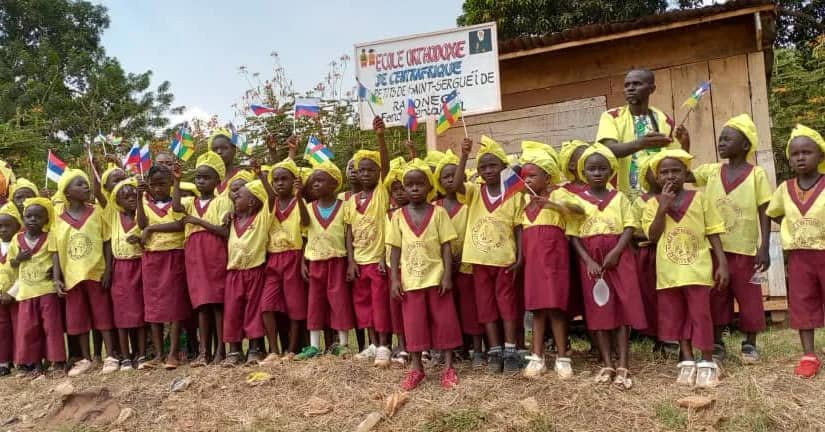
"Chekist Exarchate"
The main church institution through which Russian narratives are promoted on the continent is the Patriarchal Exarchate of Africa, established in December 2021.
After the Patriarch of Alexandria recognized the autocephaly of the Orthodox Church of Ukraine (OCU) in 2019, the Russian Orthodox Church (ROC) decided to withdraw the "parishes of the Russian Orthodox Church located on the African continent" from the jurisdiction of the Patriarchate of Alexandria and make them autonomous. This was named the "Patriarchal Exarchate of Africa." The term "Patriarchal" indicates its subordination to the Patriarch of Moscow. According to our information, its branches operate in 23 countries on the continent, which is slightly less than half.
The Patriarchate of Alexandria is one of the oldest Christian churches in the world. Its foundation is associated with the Apostle Mark, the first bishop of Alexandria, a city in Egypt. It was founded in 42 AD, and its primary jurisdiction is Africa.
The creation of its separate structure allowed the ROC to establish a systematic propaganda effort.
For example, it brings African priests to Russia for education, and they attend military forums in Moscow. After such ideological processing in the form of religious education, priests from Africa begin to praise the Russian "Special Military Operation" (SMO) and generally repeat Russian disinformation about Ukraine.
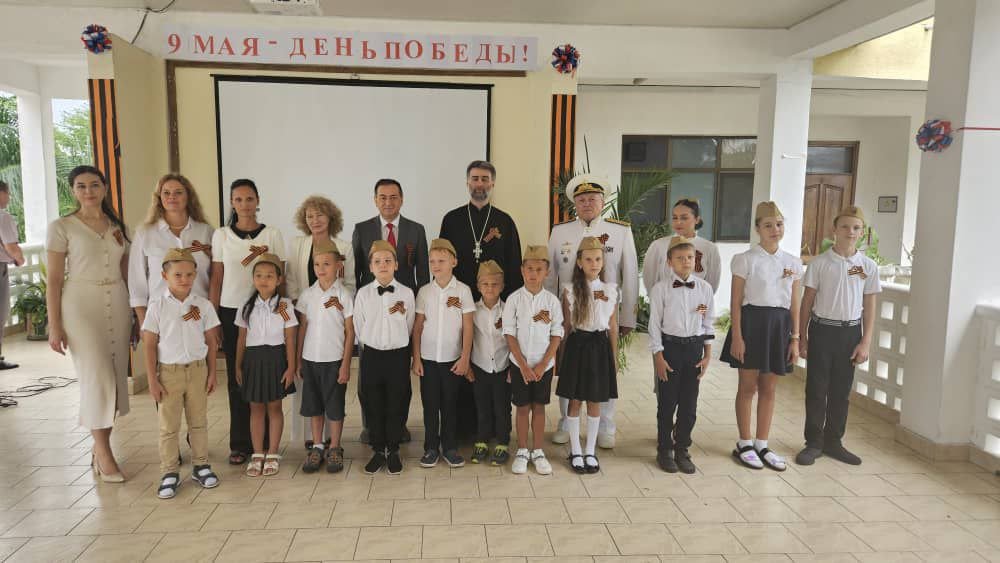
Scale
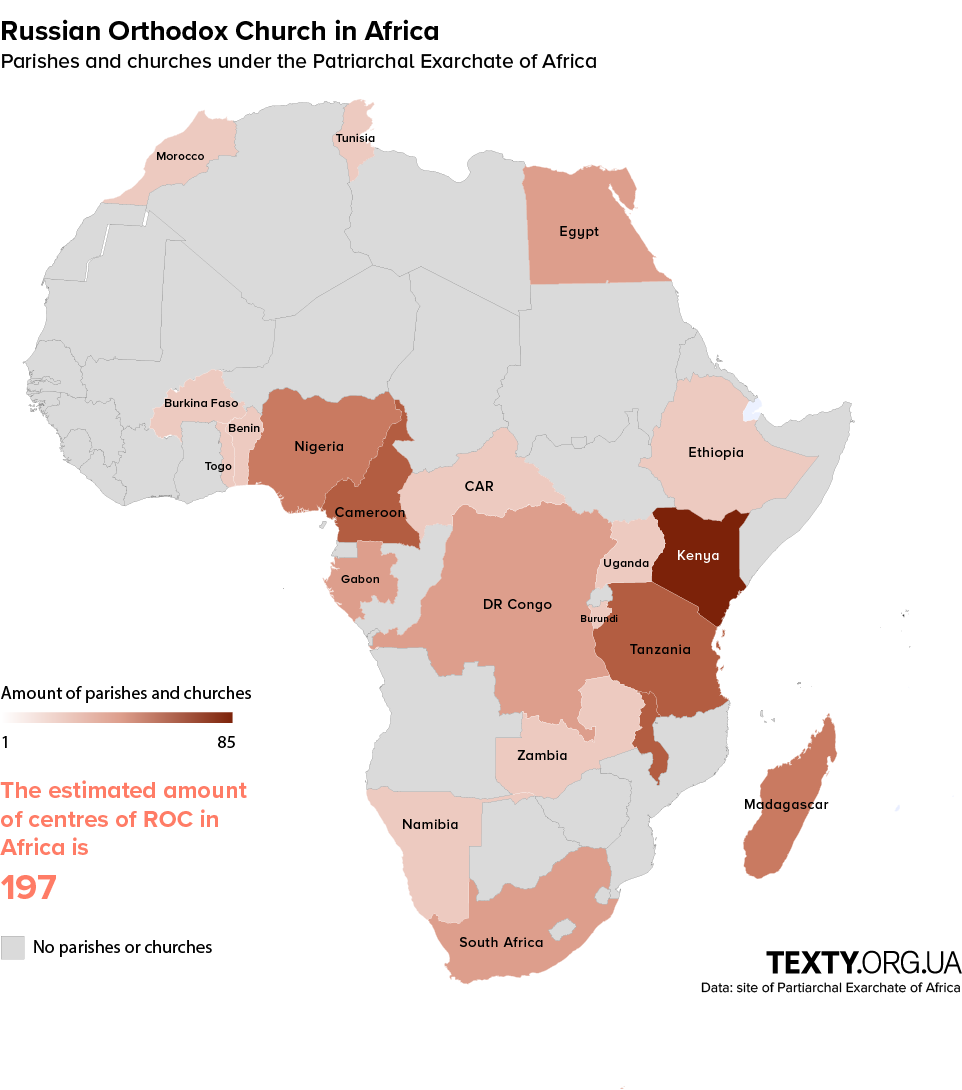
According to data from the Facebook page of the Patriarchal Exarchate of Africa, almost 200 original names of church institutions in 23 countries under the jurisdiction of the Russian Orthodox Church (ROC) can be counted. According to some Russian church figures, this structure had over 200 parishes in Africa as of 2022, but finding an exact list is impossible.
It might seem that 200 parishes is a tiny number. For example, the Ukrainian Orthodox Church of the Moscow Patriarchate (UOC-MP) has over 8,000 parishes in Ukraine (as of May 2024). However, even this number allows for a network that retransmits Russian disinformation, and the exarchate is working on increasing its number of parishes.
Not just about religion
At first glance, the Patriarchal Exarchate of Africa does not engage in any agitation or propaganda activities on the continent. However, on the website of the Patriarchal Exarchate of Africa, you can find much that is unrelated to religion and closely mirrors Russian propaganda: from accusations against the "Ukrainian schismatics" together with former President Poroshenko to Putin's statements about the collective West and Russia's intentions to "save everyone in Africa." At times, Christianity takes a back seat in such materials from the organization.
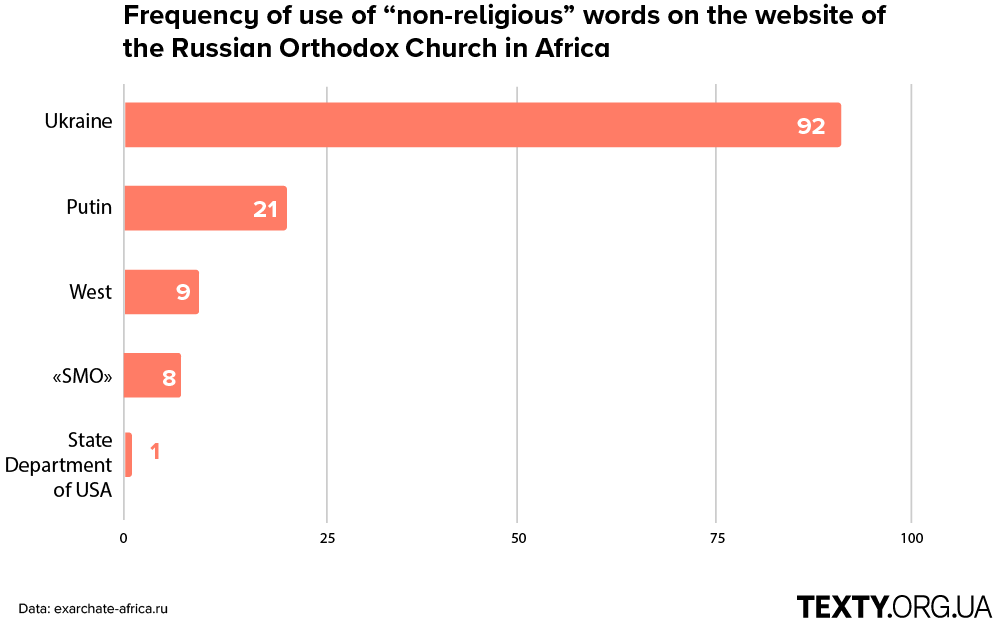
Ukrainians are often called "schismatics." For instance, the former Exarch of Africa, Leonid of Klin, at the Moscow forum "Army-2023," called Ukrainians fascists and stated that Russia is defending "not just some abstract political principles but also spiritual and moral ones" in the war in Ukraine. The word "war" has already become a familiar trigger for both the Russian part of the exarchate and the African henchmen of the ROC, but more on that later.
Furthermore, the former exarch also claimed that Russian troops are defending the faith, which is allegedly being persecuted by "Nazis," and that the U.S. State Department is influencing Ukrainian decisions regarding religion.
"In 2018, with the adoption of a series of anti-canonical decisions, the invasion of the Ecumenical Patriarchate of Constantinople into Ukraine began. It was initiated by the Ukrainian authorities and personally by President P. Poroshenko and was accompanied by constant consultations with representatives of the U.S. State Department."
Ukrainian soldiers loot churches in the Kursk region
To understand the real impact of Russian propaganda on believers in Africa, we spoke with one of the ROC priests from Nigeria — Daniel Agbaza. It is worth noting that, in order to conduct this interview at all, we introduced ourselves as Russian journalists from one of the popular publications.
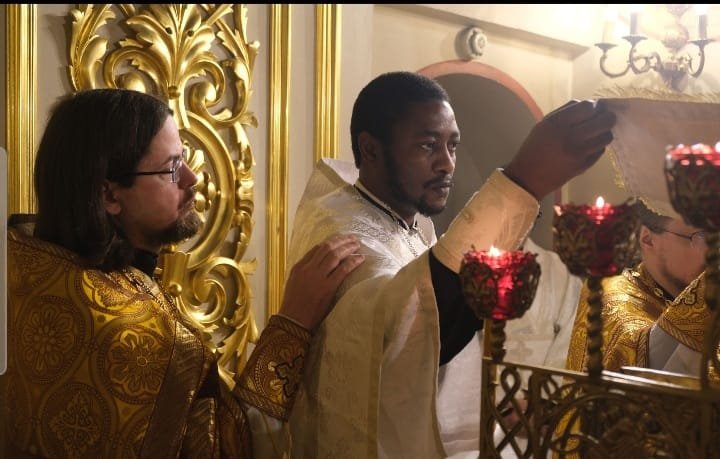
"I am a priest at the parish of Saint Andrew the First-Called in the city of Maverick. I was ordained on December 31, 2022, in Moscow. It was a significant day for me. I was the only person from Nigeria, although there were candidates from other African countries. The Exarchate provided the plane tickets.
Moscow was fabulous. The experience and the people were wonderful. I visited there twice and had a great time visiting many churches and relics. It was a spiritually enriching experience."
"Before the creation of the Exarchate, were you part of another church?"
"The Exarchate of Africa was established on December 29, 2021, by the decision of the Holy Synod of the Moscow Patriarchate. Before that, I was part of the Patriarchate of Alexandria. I studied in a seminary for 16 years, completing my theological studies at a seminary in Lagos."
"Why did you join the Exarchate?"
"Many of us from Nigeria, especially from the Patriarchate of Alexandria, joined because of the schism when the Patriarchate of Alexandria began collaborating with the schismatic group in Ukraine. We wrote to the Moscow Patriarchate asking them to accept us, and by the grace of God, the Exarchate was created, and we were accepted into the Russian Orthodox Church."
"How does the ROC help you and your community? Do they provide financial support or literature?"
"A priestly vocation is not about financial gain; it is a calling. The Church is an institution made up of people, and it also operates in the secular world. We have candidates from Africa studying in seminary in St. Petersburg and other theological schools in Russia. This is a big step for the growth of Orthodoxy. It's not just about money but also about educating and equipping people with knowledge to spread the Gospel. The Exarchate is still young, but we are making progress."
"Have you faced any obstacles from the Greek Orthodox Church in Africa?"
"Within the country, there was resistance from some Greek bishops who did not want to lose their parishes and priests. There were cases of slander, attacks on churches, and attempts to evict priests from their homes or deprive their children of scholarships. But we are not intimidated by this; we expect challenges when we do the right things."
"How has the war in Ukraine affected the Russian Orthodox Church in Africa?"
"It's a complicated situation. As Christians, we pray for peace. The situation in Ukraine is concerning because the Church there is persecuting many priests and bishops. Even though we are not in Ukraine, the persecution affects us because Christianity is one body. The challenges in Ukraine are felt in Africa, too. For example, due to sanctions, sending or receiving shipments from Russia has become difficult, affecting the Church's activities. It is also hard to exchange rubles. And, for instance, I've seen that there are attacks in Kursk by Ukrainians, where they looted churches and sold icons from there."
We asked this priest to send us materials where he saw evidence of looting by Ukrainian military personnel in the Kursk region. The photos he provided were circulated by an English-language propaganda account with almost half a million followers.
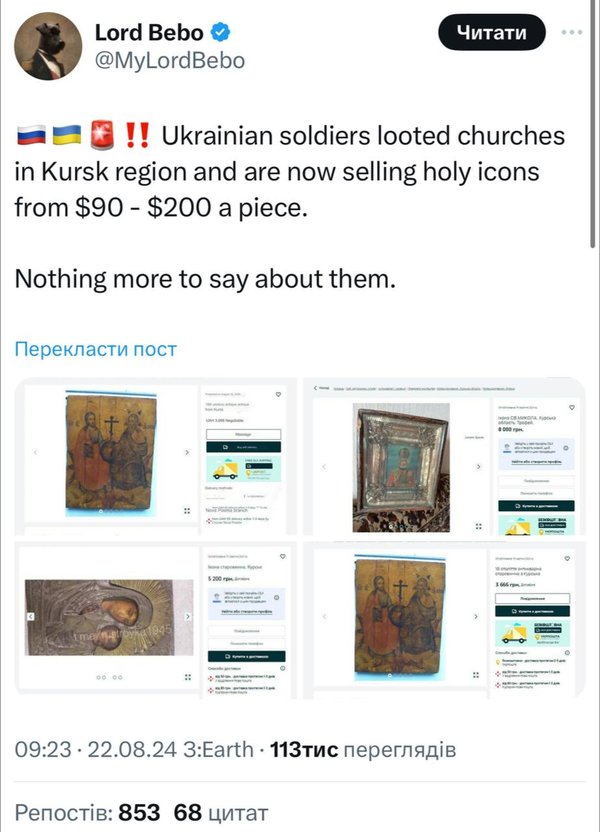
Of course, this post turned out to be fake, and of very poor quality at that. Such announcements do exist on the site, but they have much more mundane titles, without phrases like "Kursk trophies." We did not receive a single word about Russian misconduct with churches and shrines in Ukraine, nor any confirmation of attacks on civilian populations. The priest, though cloaked in religion, repeats Russian narratives.
Moreover, Daniel confirmed that the ROC provides minimal material sponsorship in Africa. The organization sends priests to Moscow and sometimes to other regions of Russia for education or simply to be religious tourists. The Exarchate helps to rebuild some parishes and churches, but very minimally, for example, simply putting a roof on a half-collapsed building or shed, which is then used for worship services.
With minimal material investments, the ROC is beginning to conquer such an important continent in the new realities. But even these pennies from Russia are quite successful in spreading bloody propaganda through religion.

